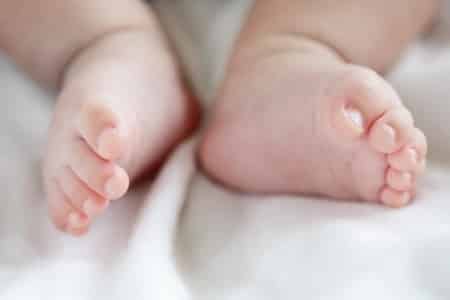To learn more about the development of legs and feet, read the previous entry on this topic: Baby’s Crooked Legs and Feet: Is it Normal?
It is very good for a baby to feel things under their bare feet, even as they age. It is another way to develop and reinforce their muscles and tendons to have better balance. At the same time, it increases the perceptions of feelings under their feet (neurological system), for example walking on a cool floor, feeling fresh grass and sand under their feet, etc.
When your baby is still not walking, it is good to regularly stand them up on their bare feet or their wearing very supple slippers based on the outdoor temperature, avoiding materials that are often very humid.
However, when your baby does not regularly stand up and stand on their feet, it is recommended that you start with semi-rigid shoes for their first steps. This light support will not affect the baby’s freedom of movement but will help their balance. Walking barefoot is popular and seems good in the house and on natural outdoor surfaces (sand, grass, bare ground) in a secure way. On the other hand, shoes are essential to protect from injuries and infections. Ideally you alternate situations with and without shoes.
Measuring a Baby’s Feet
Sizes indicated on shoes is not standardised. As such, you cannot rely on the child’s foot size to choose their shoes. How can you pick the right size? You have to try the shoe!
As long as your baby is not walking, you measure their feet sitting. When they are waling, you can measure their feet standing straight to get the best possible measure. Then try different models and you will see what is best adapted to your child’s feet. Of course, you need to understand that a baby in fast growth will have feet that will grow very quickly, thus it is important to measure them frequently, at least once a season, to see if their shoes are still adequate.
Advice from Philippe Deschênes, Podiatrist:
You should consult if your child:
- Walks on their tip-toes all the time starting from 6 months of age;
- Has flat feet after 3;
- Seems to trip all the time;
- Irregular and unequal steps from one foot to the other;
- Limps while walking;
- Cannot walk a long time, always wants to be picked up or go in the stroller even at an older age;
- Gets tired playing sports;
- Indicates pain while walking or in their feet or indicates pain at night. Pain that can also seem like growth pains.
Things to consider:
- Chose well-adjusted shoes to avoid pressure on the feet that will cause redness, injuries or damage growth. Frequently change the shoes as they grow.
- Chose quality shoes to avoid transpiration, prolonged humidity, redness, eczema, odour, discomfort etc.
- Even with a quality shoe, you can remove the insert to dry it as needed.
- Don’t cut your baby’s toenails too short in the corners to avoid ingrown toenails, as very young babies have very thin nails that easily penetrate the skin.
- To allow your baby to walk barefoot, avoid public spaces to prevent plantar warts.
Thanks to Philippe Deschênes, from the Clinique podiatrique de l’Estrie, as well as his team.
I hope this article has answered some of your questions! If you have comments, please leave them! I look forward to reading you!
See you soon,
Marie
The Baby Expert
 |
Clinique podiatrique de l’Estrie
1135, boulevard Jacques-Cartier Nord
Sherbrooke (Quebec) J1J 3A8
Phone : 819 820-1157
[email protected] |


